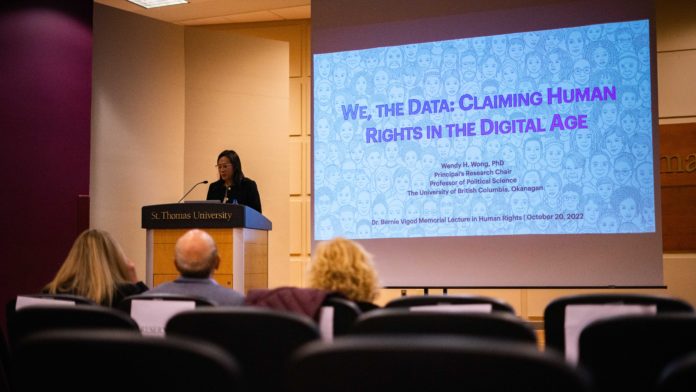

Wendy Wong, a political science professor at the University of British Columbia, gave a lecture on human rights in the digital age at this year’s Dr. Bernie Vigod Memorial Lecture in Human Rights.
The lecture, titled “We, the Data: Claiming Human Rights in the Digital Age,” took place on Oct. 20 and explored the challenges for human rights as human experience becomes “dataficated.”
“Our lives have become data,” said Wong. “As our devices become more and more data-intensive … our mundane activities become data.”
Wong said companies are interested in our day-to-day activities and they are surveilling people using smart watches, doorbells, cellphones, apps and other devices.
“Some of these things that we now take for granted have become essential and have made life easier,” she said. “I don’t think they are going away … but I do think human rights have been missing from the conversation.”
Wong said while we are the subjects of data, we are not the “stakeholders,” which is why we are disempowered and seen as a product.
“You’ll hear about the right to privacy and freedom from surveillance, but those are just a handful of the rights that have been developed in a large scheme,” she said.
She also used the term “stickiness of data,” which means it is easy for companies to collect daily data but hard to delete it as an individual. Furthermore, data is not confined to one company, but it is purchased by governments, individuals and other companies.
“Even though you are the source of data, you are not creating it … and you are not in control of what that data is used for,” said Wong.
One example she used is facial recognition technologies and how they are being used without the consent of people.
“Is data from your face yours or from your collector?” she asked. “If you have any generally accessible websites, your face is probably in a database.”
Additionally, facial recognition struggles with dark-skinned and non-male faces, showing a bias passed down from developers to the technology. This has led Black people to be vulnerable to AI bias, which has real-life consequences on their lives.
Wong argues data literacy should be a human right, as it recognizes how important data has become to us. It would also make regular people part of the conversation on datafication of our lives.
“Most of us are not making the choices, even if we are subjects of those choices,” she said.
Nicolas Atkins, an exchange law student from Peru, said listening to Wong was an enriching experience for knowing what to expect for the future of human rights.
“I think the talk touched on a very important topic since today and especially after the pandemic, we have entered digital life,” he said.
Atkins adds that many assume that technology is intrinsically good and without error, but conversations like this make him contemplate a different reality.
“It is important to keep in mind that technology can be of great help but, at the same time, it carries a great risk if it is not used appropriately,” he said.
